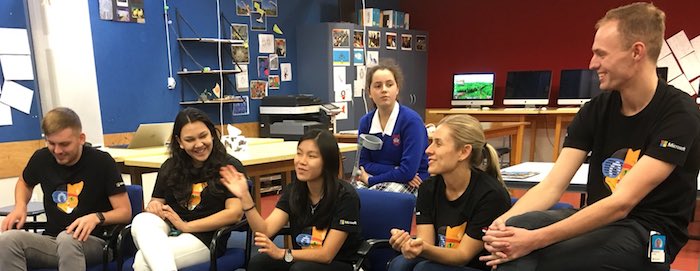You're Not In 2006 Anymore, Toto: The Future Of Education
Content only gets you so far, but learning skills gets your further. We’ve traditionally viewed school as a place to learn content, however where I see it heading is a place to truly develop skills that stand the test of time. That’s exactly what Newlands Intermediate is doing with their Minidevs programme and instead of teaching content they are enabling kids to not only create the content, but also learn how to learn!
(This post is written by Anna Lim, the Enterprise Channel Manager for Education at Microsoft New Zealand)
The hype around Augmented Reality/Virtual Reality (AR/VR) is growing in the world of Education and, as of now VR is becoming more mainstream whilst AR is still a bit of a magic trick (people need to try it to believe it or even understand it). When talking about AR/VR in education the conversation is usually about a new way to consume content, interactive learning and far more interesting modes of learning compared to tradtiional textbooks or a slide deck. All these things are true but what’s less talked about is using it as a platform that can drive the 5Cs of 21st Century Learning: Collaboration, Creativity, Communication, Critical Thinking and Compassion.
At Newlands Intermediate they have been working with Theta to shake things up around how they engage their students. It is the second year of a programme they run called MiniDevs: an after-school, extra-curricular group of real kids working with real Devs. They learn to code and create for the HoloLens and Windows 10 Mixed Reality using a platform built by Theta called Theta MIX. This platform allows people to script interactive mixed reality experiences in their browser that can run on headsets, smartphones, tablets and PCs. When I first heard of this I immediately flashed back 12 years to recall what I was doing at that age at school… nothing this fancy or cool that’s for sure!
[caption id="attachment_10165" align="aligncenter" width="700"] Author Anna Lim is third from the left in this photo[/caption]
Author Anna Lim is third from the left in this photo[/caption]
In May, I and five other graduates from Microsoft were invited to spend an afternoon with the MiniDevs. We started the session with each introducing ourselves and what we do at Microsoft. One by one we were given a challenging Q&A session by the students…they grilled us about our jobs, our products and solutions and even why we had a competitor’s logo on our T-shirts (tough crowd!). I think I heard some nervous laughter from the Microsoft team but safe to say we managed to answer all their questions!
Then we moved on to a bit of a friendly Dragon’s Den type activity, as each student took turns pitching to us their ideas that could be created in Theta MIX. This is the moment where we were all blown away as while we were asked to provide some feedback and guidance, I think we were the ones learning from them that afternoon. The students have more creativity flowing through them than any of us “MicroDevs” - a term coined by the students for us (but full disclosure only 2 of us can code!).
After leaving the session buzzing and in disbelief, I reflected on what I’d learned from that one afternoon engaging with these amazing kids:
- Have confidence in your ideas and be supportive of others
I used to be petrified of presentations as a child and avoided it whenever I could because I thought people would think my ideas were dumb. The group of students were nervous, but they built up the courage to give it a go anyway. They were met with a supportive audience that asked questions and made suggestions that helped each person constructively drive their idea further. - Hold onto your inner child when it comes to creativity and curiosity
I think as we get older, we become less creative and curious, this is likely because we learn more about boundaries, rules, norms, and sensibilities. Creativity is a skill we have to actively foster and success is only limited to your imagination. Don’t let your adult brain too quickly discard an idea or thought without giving it some time to see where it goes first. - Get out of your comfort zone
What I’ve noticed in our education system (but also in the commercial world) is that many schools and universities are waiting for others to take the road less travelled before they venture down it themselves. Newlands Intermediate and Theta are challenging the status quo to try something that very few schools have attempted. It hasn’t always been smooth sailing for them but that’s the beauty of it and they’ve learnt from their successes and their failures and I can see MiniDevs shaping up to be a world class innovative example of learning.
I left Intermediate School 12 years ago and a lot has changed, and will continue to change even more in the area of education. I’m so excited for the future of education and I’ll leave you with one last note:
“The heart of ‘21st Century Learning’ is not about the tools, it is about learning how to learn. Helping our students become proficient and independent life-long learners is central to their success in navigating through unchartered change.”
- Marianne Malmstrom, Digital Design Teacher at Newlands Intermediate School
If you’d like to know more about the epically cool stuff that Newlands Intermediate and Theta are doing, feel free to contact me or the organisers of MiniDevs: Marianne Malmstrom(Digital Design Teacher At Newlands Intermediate School and Educational Technology Consultant), Tim King or Jim Taylor (Theta Innovation Lab Developers).
More info:
https://www.theta.co.nz/news-blogs/theta-news/the-minidevs-meet-the-microdevs/
https://www.theta.co.nz/news-blogs/theta-news/gaming-the-digital-curriculum/
MiniDevs Twitter: @MiniDevsNIS